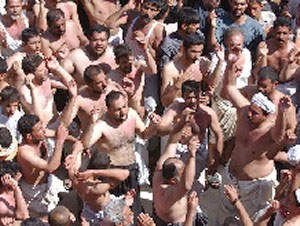Northern oil fields around Kirkuk remain out of production; when they are reopened, Crear said Iraq could move toward its prewar production of 2.8 million barrels a day, and provide crucial revenue for reconstruction. In Egypt, President Hosni Mubarak urged the United States and Britain to withdraw their forces from Iraq as soon as possible. He urged a "concerted international effort" to help form legitimate government chosen by Iraqis. In the holy cities of Karbala and Najaf, Wednesday was the climax of an emotional pilgrimage - peaceful so far - that has drawn an estimated 1 million Shiite Muslims. With Saddam Hussein's regime toppled, it was the first time since the 1970s that Iraq's Shiite majority could participate freely in the march to the cities' shrines. Thousands of the pilgrims took part in an anti-American demonstration Wednesday. Among the banners were some that read, "No to America, no to Israel, yes to Islam." American investigators were trying to figure out how hundreds of millions of U.S. dollars - possibly genuine, perhaps counterfeit - ended up in Iraq despite economic sanctions in place since 1990. The latest stash - $112 million - was found by Army civil affairs soldiers inside seven dog kennels in a wealthy neighborhood where top regime officials once lived, the Los Angeles Times reported Wednesday. The Times and the New York Post said four soldiers were under investigation in the alleged theft of about $900,000 of a huge stash of dollars found earlier in the same neighborhood. Some of the cash has been stumbled upon almost by accident, while the intensive nationwide search by U.S. teams for banned weapons of mass destruction has yet to turn up conclusive evidence of chemical or biological weapons. Six Iraqi scientists working at Baghdad research institutions told The Associated Press they were ordered to destroy some bacteria and equipment and hide more in their homes before visits from U.N. weapons inspectors in the months leading up to the war. All the scientists said they were involved in civilian research projects and all said they knew of no programs for weapons of mass destruction. It was not clear why their materials, ostensibly for nonmilitary research, were ordered destroyed. But their accounts indicate Saddam's regime may have had advance knowledge of at least some of the inspectors' visits, as the United States suspected, and that the regime was concerned about any material that could raise the suspicion of U.N. experts. A grim legacy of Saddam's regime was being dug out of shallow graves on the grounds of Baghdad's Abu Ghraib prison, where several bodies have been found buried face down, hands bound behind their backs and gunshot wounds to the head. "At least now we know they are dead, thanks be to God," said Saad al-Niami, an army colonel. "Our families can get rest now." Saddam's secret services used the prison as a detention center, said Gen. Hossam Hussein, commander of guards there. He said it was built for 800 prisoners, but held 1,200. Relatives said countless men were executed there during the final days of Saddam's teetering regime. The mood was dramatically different in a lucky batch of Baghdad neighborhoods - about one-fifth of the city - where power was restored for the first time in three weeks. Baghdad residents and the U.S. military have listed power as the capital's key need - to deter looting and help get a municipal administration back in operation. In Europe, many of an estimated 135,000 Iraqi refugees should return home once their country is rebuilt, said Greek Prime Minister Costas Simitis, whose country holds the European Union's rotating presidency. "When there is a normalization, they should go back," Simitis said in Copenhagen, Denmark. "There is no reason for political and economic refugees to stay." In Karbala and Najaf, huge throngs of Shiite pilgrims continued their observances. Some flailed their backs and inflicted cuts on their heads as they marched to the beat of drums. Among the anti-American demonstrators was Khudayer Abbas Musawi, a 25-year-old engineering student. "America came here not to free the Iraqi people but for oil," he said. Such sentiment was not unanimous. Said Kathem Jasim Mohammed, a 50-year-old vendor,: "I want to thank Mr. Bush for breaking the prison Iraq was in." After midday prayers, the crowds began to diminish, although many pilgrims were expected to remain for observances Thursday in Karbala - site of the 7th-century martyrdom of Hussein, a grandson of the Prophet Muhammad. Since Saddam fell, Shiites have been setting up local administrations, and religious leaders have emerged as key sources of political power. Jay Garner, the retired U.S. general overseeing the postwar reconstruction, arrived Wednesday in Irbil, the administrative capital of Iraq's Kurdish region. It was Garner's second day in the region, where he has extensive contacts stemming from his direction of a U.S. military mission to protect Kurds who fled their homes when Saddam put down an uprising following the 1991 Gulf War. Asked at a news conference how soon life in Iraq could return to a semblance of normalcy, Garner said "Everything has to be done in a secure environment. ... Security is getting better every day." "In a very short order you'll see a change in the attitudes and the will of the people themselves," he added. British Defense Secretary Geoff Hoon toured the southern port city of Umm Qasr - becoming the highest-ranking British or U.S. politician to visit Iraq since the war. He shook hands with port workers and petted Buster a sniffer dog who has discovered several arms and drugs caches. Hoon said U.S. and British forces had not given up looking for Saddam, and speculated that the deposed leader was still in Iraq. "In the end, we don't know, but in my best judgment, he is," Hoon said.
|
